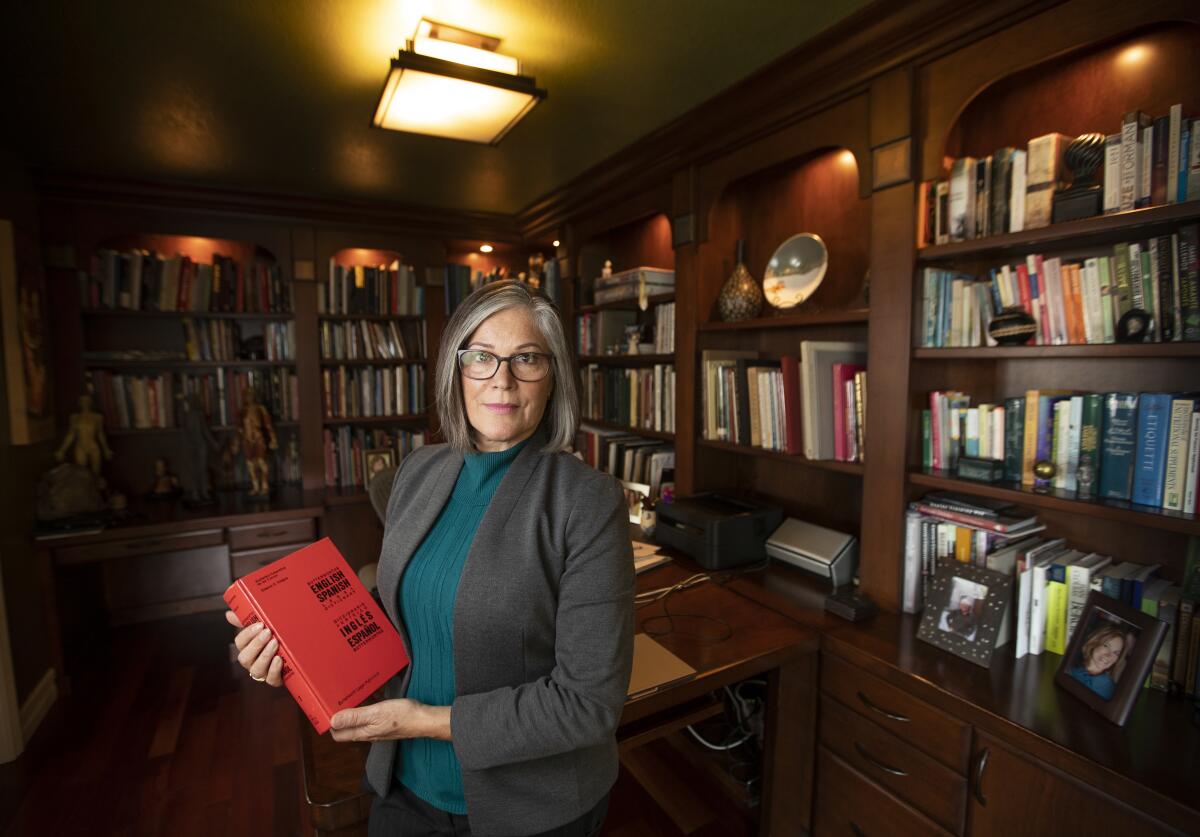California has a new law for contract workers. But many businesses aren’t ready for change

- Share via
For nearly 18 months, California’s ambitious legislation curbing the use of independent contractors was the focus of noisy street protests, furious lobbying and fearful newspaper editorials.
Now Assembly Bill 5 is signed into law and will take effect in January. So businesses will automatically reclassify hundreds of thousands of contractors as bona fide employees with benefits, right?
Not so fast.
Even as the law’s supporters celebrate what they call the nation’s strongest attack on inequality in the workplace, it is hard to find any California industry that is not hoping for a future carve-out.
Technology behemoths Uber, Lyft and DoorDash, which treat drivers as independent contractors, have garnered national attention as they prepare to file a ballot initiative exempting themselves from the law.
But the upheaval extends far beyond Silicon Valley. Businesses in dozens of sectors, including trucking, entertainment and translating, are scrambling to figure out how the law affects them, whether they must adapt to it, and, especially, whether they can persuade lawmakers next year to add them to a score of carved-out occupations such as doctors, architects, financial advisors and fine artists.
“There are many industries that still need to be added,” the California Chamber of Commerce asserted in a statement Sept. 18. “The business community will be aggressively pursuing further exemptions.”
Hiring workers as employees rather than contractors can add 20% to 30% to labor costs, given Social Security and Medicare taxes, unemployment and disability insurance, workers’ compensation, sick leave, minimum wage, overtime, rest breaks and protections against discrimination and sexual harassment.
Labor leaders argue that workers deserve those benefits, and they hope to organize newly classified employees — since independent contractors may not join unions under federal law.
“For far too long, big corporations skirted their responsibility to provide basic protections to workers,” said Art Pulaski, executive secretary-treasurer of the California Labor Federation. “The California labor movement will be laser-focused on implementing and enforcing AB 5.”
The law codifies and expands on an April 2018 California Supreme Court decision that set a strict new test for employers. Independent contractors must be free to perform their work as they wish, must be in a different line of work from the company contracting with them and must operate their own business.
Contractors are divided over the law, with some seeking the protections of traditional employment and others preferring their independent status.
Can solutions be crafted to satisfy those who are unfairly cheated out of wages and benefits while at the same time serving those who view employee status as a straitjacket?
For a sense of the complexities, consider three industries: trucking, translating and music-making.
Port Trucking
Some 13,000 truckers regularly serve the ports of Los Angeles and Long Beach. Just a few hundred are classified as employees, despite a decade-long organizing campaign by the International Brotherhood of Teamsters.
Most of the rest are considered “owner-operators” who traditionally leased their rigs from trucking companies, drive under those companies’ permits and rely on them for work assignments. They are paid by the load and get a 1099 independent contractor tax form at the end of the year.
The model has led to widely publicized abuses. To meet clean-air regulations, trucking companies forced drivers to purchase new trucks beginning in 2008 rather than assume the expense. Many drivers, who also paid for diesel fuel, repairs and insurance, fell into debt as they worked overtime to pay off huge loans for their rigs. If they missed payments, some companies reclaimed the trucks and fired the drivers, seizing their equity.
Since 2011, more than 1,000 port truckers have filed wage theft and misclassification claims with state officials and been awarded more than $50 million in back pay and penalties. But many trucking companies have found it cheaper to pay the fines rather than hire the workers as employees.
Now, in the wake of the 2018 state Supreme Court decision and the new law, a few carriers are converting to an all-employee model or one that encourages contractors to take out their own permits and insurance.
Most, however, are hoping that a California Trucking Assn. lawsuit will reach the U.S. Supreme Court and preempt AB 5 under a federal law that governs interstate commerce, according to Weston LaBar, chief executive of the Harbor Trucking Asson., which represents about 100 of the larger drayage companies.
“It is going to be years before we have an understanding of how — or even if — AB 5 applies to the port trucking community,” he said.
Carriers are also counting on the Legislature to revisit the issue next year and at least create an exemption for independent contractors who clearly have their own separate businesses and can carry loads for multiple companies.
The Harbor Trucking Assn. set up a program last year to help individual truckers convert to such a model for less than $500, also offering them discounted insurance and fuel.
Golden State Logistics, a Rancho Dominguez company with 40 independent contractors, is one company pushing its workforce to be more self-sufficient.

“There’s bad players in every industry,” said Paul Kerwin, a Golden State Logistics vice president. “That’s the part you read about in the press. But most independent contractors — whether they have their own [permits] or not, want to remain independent. Their voices are not heard.”
Since last year, 30 Golden State Logistics contractors have set up limited liability companies with their own permits and insurance. They can drive for multiple companies. “We had the foresight to see which direction California was going,” Kerwin said.
As for AB 5, he added, “We are agnostic. Whether independent contractors or employees, what’s important is they have a choice.”
But the company’s policy is now “if they want to haul with us, they have to have their own LLC,” Kerwin said. If they want to be hired as an employee, with the benefits that entails, he refers them “politely” to other companies.
Marvin Estrada, a San Pedro trucker, counts himself as a ”100% real independent contractor” and businessman. “A lot of owner-operators are misclassified,” he said. “They use the company’s permits and the company tells them how much they’re going to pay them, and they can’t go move a load for any other company.”
With his own permits and insurance, Estrada, 40, nets about $6,000 a month, enough to pay his $3,500 a month home mortgage. Employee trucking jobs pay about $29 an hour, he said. “How could I live on that?”
AB 5, Estrada added, “is a good law, because it’s going to push us to be real independent contractors, with the freedom to work for any company.”
Entertainment
J. Ross Parelli, 38, is an Auburn, Calif.-based singer and emcee who recently toured Seattle, Atlanta, Florida and Los Angeles. She is preparing an album for release next year and she runs a nonprofit called Beats|Lyrics| Leaders, which brings musicians into schools and Native American reservations as mentors.
For all that, she relies on gig workers, including backup musicians, recording engineers and singers she pays on a per-session basis.
Parrelli is worried that under AB 5 she might be considered an employer of those people. “If I pay minimum wage, health insurance, paid sick days, overtime … I’m adding 30% to my labor costs,” she said. “I have to get session players, pay someone to do my marketing, make a music video, do a tour. How am I supposed to pay employment taxes on all that? It doesn’t make sense.”
AB 5 does not include carve-outs for entertainment industry laborers including musicians and film crew workers.
While little was heard, at least publicly, from the independent movie industry, cable television or documentary film companies — all of which rely heavily on independent contractors — music industry advocates actively lobbied for an exemption. The Recording Industry Assn. of America and groups that represent artists and indie labels said AB 5 would treat independent musicians as employers when they hire sound mixing engineers or pay a trombonist to play a hook on a new track, for example.
“While changes in technology have made it possible for artists to remain independent and create music on their own terms, this law will force them to make that music outside of California,” wrote the RIAA, the American Assn. of Independent Music and the Music Artists Coalition in an open letter, suggesting that musicians were being treated “like Uber and Lyft executives rather than their drivers.”
The possible effect on film and television production is less clear. Entertainment industry unions, including the Screen Actors Guild‐American Federation of Television and Radio Artists and the International Alliance of Theatrical Stage Employees, Moving Picture Technicians, Artists and Allied Crafts, argue that the law won’t have a significant effect. Much of film and TV work, at least for major studios and production companies, is covered under collective bargaining agreements, with workers classified as payroll employees.
However, some entertainment lawyers say the law could affect smaller productions, including those in the growing digital video business, and post-production houses that aren’t governed by union contracts and use independent contractors.
“Something like this definitely has the propensity to affect lower-budget films,” said Los Angeles-based business litigator Jordan Matthews of the firm Weinberg Gonser, who previously worked as a film financier and producer.
The Independent Film & Television Alliance, the trade group that represents smaller production companies and financiers, declined to comment.
Some attorneys also suggest that the law could gut so-called loan-out corporations, which many entertainment industry workers set up for tax purposes.
Union officials dispute that analysis. In an August letter to members, SAG-AFTRA wrote that the law would “have no impact on the use of loan outs by our members,” citing its “exhaustive due diligence on the matter with our own in-house and outside counsel, and in cooperation with a broad coalition of entertainment unions, prominent industry CPAs, entertainment attorneys and legislative staff.”
But that’s of little solace to Parrelli, who, like many independent recording artists, is not a member of the American Federation of Musicians. She and other musicians visited the state Capitol to protest the law, she said. Many of those who went, she said, were also Uber and Lyft drivers.
“Our whole millennial generation relies on being independent contractors,” she said. “We just need an exemption.”
Translating
As legislators finalized AB 5, more than 5,000 translators and interpreters signed an open letter calling on lawmakers to allow them to remain independent contractors. “We are not the ‘gig economy’ workers AB 5 is designed to protect, but rather highly trained and skilled professionals,” they wrote.
But the bill did not exempt them.

Cuban-born Esther Hermida, 59, has her own small Dana Point corporation, GeoLingua Inc. She interprets for federal and state courts, private law firms, conferences, Hollywood award ceremonies and the “Judge Judy” TV show. “Being an employee wouldn’t allow me to be as creative,” she said.
Hermida turned down an employee job offer with the Los Angeles County Superior Court, whose interpreters are represented by the California Federation of Interpreters, a division of the Communications Workers of America union. “Working part time for myself, I can make $100,000 a year,” she said — more than the roughly $85,000 that full-time employees can earn.
Besides her own jobs, some of which come through larger agencies, Hermida operates as an agency herself, parceling out assignments to a few other interpreters and taking a cut of their fees. Under AB 5, she fears she would have to treat them as employees, paying payroll taxes and other costs.
Michael Ferreira, president of the California Federation of Interpreters Local 39000, an AB 5 supporter, says many interpreters are misclassified as independent contractors for large national translation companies and have no control over their wages or working conditions. He points to SOS International, a Virginia company tapped by the federal government to provide interpreters in immigration courts.
“They work solo for hours without breaks, when best practices require team interpretation, with switches about every half-hour,” he said. “After 30 minutes, you become exponentially less precise.”
Virginia-based SOS did not respond to repeated messages.
Meanwhile, Hermida is not giving up. “I’m not going to adapt my business to this law,” she said. “I’m going to fight it. If we have to take it to court, we will.”
More to Read
Inside the business of entertainment
The Wide Shot brings you news, analysis and insights on everything from streaming wars to production — and what it all means for the future.
You may occasionally receive promotional content from the Los Angeles Times.












